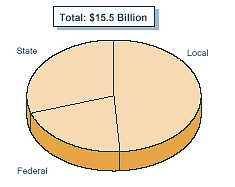
• Transportation in California is funded from a variety of state, local, and federal fund sources.
State Funds
• State funds consist primarily of the state excise tax on gasoline and diesel fuels and truck weight fees.
• Additional fund sources include most of the state sales tax on diesel fuel, a small portion of the state sales tax on gasoline, bond proceeds, and appropriations of General Fund revenue.
• In 1999-00, state funds are estimated to provide about $4.5 billion
for transportation purposes.

Federal Funds
• Federal transportation funds are apportioned to California based on the state's contribution to the federal Highway Trust Fund through federal taxes on gasoline and diesel fuel.
• In 1999-00, California is estimated to receive about $3.3 billion in federal transportation funds.
Local Funds
• Over one-third of local funds for transportation are derived from optional local sales taxes (on all sales, not just gasoline) dedicated for transportation purposes.
• In 1999-00, we estimate that local funds will constitute half, or about $7.5 billion of all revenues for transportation.
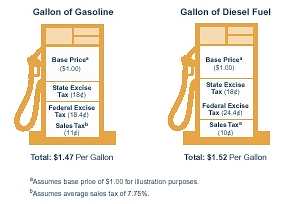
• State and federal transportation revenues are collected
primarily through the state and federal excise (per gallon) taxes on gasoline
and diesel fuel.
• Californians pay the following taxes at the pump:
• 18 cents in state tax for each gallon of gasoline and diesel
fuel (generally referred to as the "gas" tax).
• 18.4 cents in federal tax for each gallon of gasoline.
• 24.4 cents in federal tax for each gallon of diesel fuel.
• 7.25 percent uniform state and local sales tax, plus
optional local sales taxes for transportation or other purposes varying by county.
The majority of the uniform state and local sales tax proceeds are not
used for transportation purposes.
• The state also collects weight fees on commercial vehicles (trucks)
based on the unladen weight of the vehicle.
2000-01
(Dollars in Billions)
• The state receives about 65 percent of the revenues from the state
gasoline and diesel excise taxes, while cities and counties receive about 35 percent
for local streets and roads.
• The state's share of the gasoline and diesel tax revenues, along with
truck weight fees, are deposited in the State Highway Account (SHA).
• The California State Constitution (Article XIX) restricts the use of
state gasoline tax revenues for certain purposes. These monies may only be used
to plan, construct, maintain, and operate public streets and highways; and to
plan, construct, and maintain mass transit tracks and related fixed facilities
(such as stations). The gasoline tax revenues cannot be used to operate
or maintain mass transit systems or to purchase or maintain rolling stock (trains,
buses, or ferries).
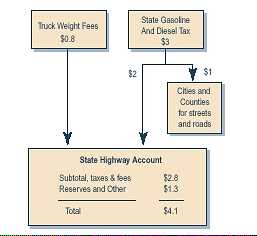
What the Sales Tax Rate Includes
• In addition to state and federal excise taxes paid on each gallon of
gasoline and diesel fuel, California imposes sales tax on most purchases, including
gasoline and diesel fuel.
• Statewide, there is a uniform sales tax of 7.25 percent on most purchases.
This sales tax rate can go up to 8.75 percent when optional sales taxes
are included. The sales tax rates paid in California are a combination of several
tax rates levied by the state and individual local governments.
• State Tax Rate. This is a 6 percent uniform rate which
includes a 5 percent General Fund rate, plus two one-half cent (totaling 1 percent)
special fund rates for local health care and criminal justice purposes. • Uniform Local Tax Rate. A 1.25 percent uniform rate is
levied in all counties. Of this total, 1 percent is allocated to cities and
counties for general purposes, while the remaining 0.25 percent is dedicated
to transportation.
• Optional Local Tax Rates. Local governments are authorized
to levy additional local sales taxes, with voter approval, for a variety of
purposes. These taxes are generally imposed in quarter-cent or half-cent increments
and generally cannot exceed 1.5 percent. (San Francisco and San Mateo Counties
are authorized to levy up to 1.75 percent to 2 percent in optional taxes, respectively.)
How Sales Tax Revenues Are Used
• Public Transportation Account. A small portion of the
sales tax on gasoline and the majority of the sales tax on diesel fuel is provided
to this account (as discussed in greater detail later). This account supports
mass transportation activities.
• Local Transportation Funds. A 0.25 percent uniform tax
on all sales is dedicated to transportation uses, primarily for transit.
• Optional Local Sales Tax. Optional sales taxes (0.5 percent
to 1.5 percent) may be imposed by local governments for transportation purposes.
These activities include highway construction, street and road maintenance,
and subsidies for transit operations.
• State General Fund. Essentially 5 percent of the uniform
sales tax is dedicated to the state General Fund.
• Local Funds. A 2 percent uniform sales tax provides revenues
for local purposes. One percent is dedicated to local health and criminal justice
purposes. The remaining 1 percent is for city and county general purposes.
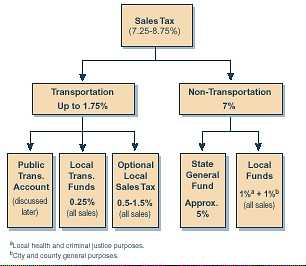
2000-01
(Dollars in Millions) • Nontransportation Purposes. As the figure shows, the bulk
of sales tax revenues from the sale of gasoline and diesel goes to nontransportation
purposes. Of the total sales tax revenues ($1.7 billion) from these products
in 2000-01, about 82 percent ($1.4 billion) will go to local and state general
fund purposes. This includes $420 million for local general fund purposes and
almost 1 billion for state general fund purposes.
• Transportation Purposes. The portion of statewide sales
tax revenues dedicated to transportation will total about $307 million
in 2000-01 and goes to local transportation ($105 million) and the public
transportation account ($202 million). These funds are derived as follows:
• For each gallon of gasoline, the state sales tax of 4.75 percent
on 9 cents of the state excise tax—equivalent to 0.4275 cents per gallon
of gasoline (about $63 million in 2000-01)—goes to the Public Transportation
Account (PTA). The PTA is the primary source of state funds for mass transportation
purposes, and the only state transportation fund which can currently be used
to purchase rolling stock (that is, buses, trains, or ferries).
• State sales tax of 4.75 percent on the price of each gallon of
diesel fuel (including the federal excise tax, but not the state excise tax)
goes to the PTA (about $139 million in 2000-01).
• State sales tax of 0.25 percent on all sales is deposited
in the Local Transportation Fund (LTF) which is generally restricted to local
transit needs (about $1.1 billion in 2000-01 including about $105 million
from gasoline and diesel fuel sales).
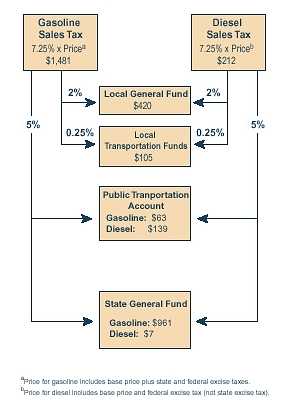
| Transportation
Equity Act for the 21st Century
Major Provisions |
| (1998-2004) |
| Funding |
|
|
|
|
| Highways |
|
|
|
| Transit |
|
|
• Basis for State's Share. The state's share of funding for the major highway and transit programs is based on a variety of factors, including highway lane miles, congestion, population, and air quality. The state and local agencies may also apply for discretionary grants on an annual basis.
• State's Share of Federal Funds. Federal funds constitute about one-fifth of the state's transportation funding in 1999-00. (See figure on page 18.)